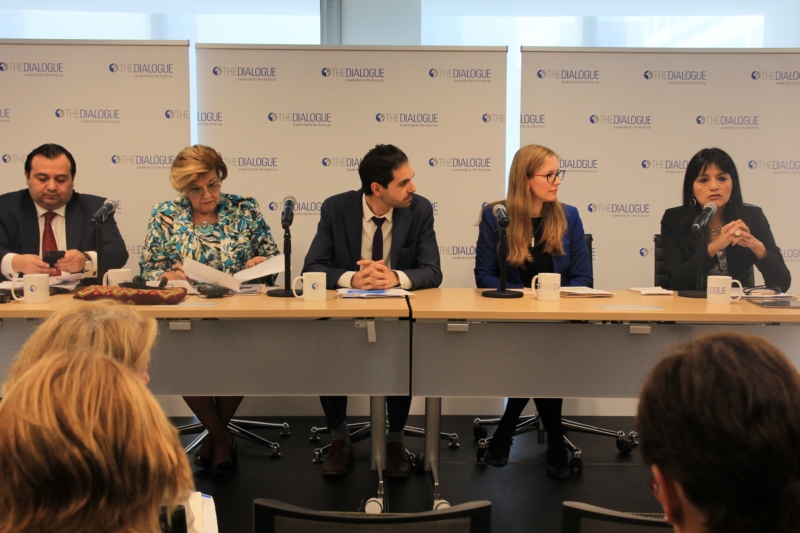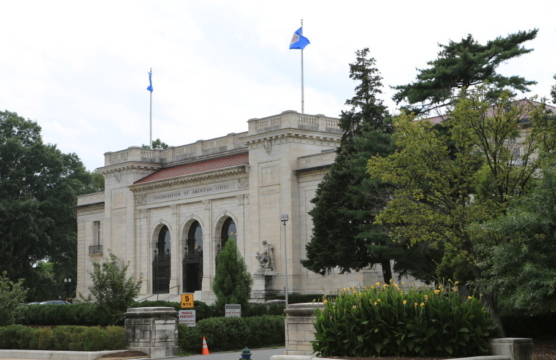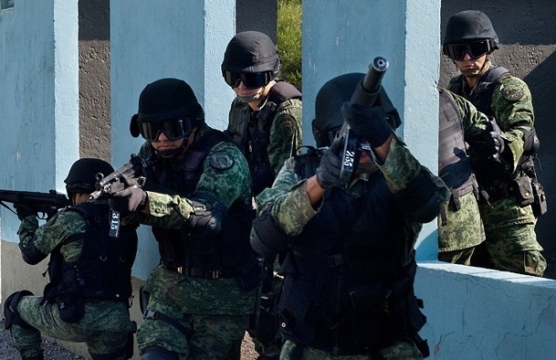IACHR Report on Citizen Security & Human Rights
Citizen security remains a top concern for most Latin American governments as crime and violence spiral out of control and cripple political and economic institutions in the region.
On May 21, 2019, the Inter-American Dialogue, in partnership with the Due Process Law Foundation (DPLF), the Open Society Justice Initiative and the Center for Justice ad International Law (CEJIL) hosted a civil society forum with candidates for the Inter-American Commission on Human Rights, the primary human rights organization in the Americas. Of the five candidates running for election or re-election to the seven-member body, three were present at the forum: Julissa Mantilla Falcón (Peru), Esmeralda Arosemena de Trotiño (Panama), and Edgar Stuardo Ralón Orellana (Guatemala). The discussion was moderated by Michael Camilleri, Director of the Peter D. Bell Rule of Law program at the Inter-American Dialogue, and Katharine Valencia, Senior Legal Advisor at DPLF. Opening remarks were given by Elsa Meany, Senior Program Officer at the Center for Justice and International Law.
The IACHR is a seven-member body elected by member states of the OAS to oversee human rights protections in the region. Each member serves a four year term and may be re-elected once.
During the discussion, the moderators posed a variety of questions to the candidates, some of which had been submitted by the public on Twitter.
Camilleri began the discussion by asking each of the candidates about their qualifications for the position.
Mantilla said that she has been working in human rights for over 30 years, both as an educator in law schools in the region and through training of magistrates, functionaries, police officers, military forces, and human rights organizations in human rights law and practice. She has also dealt directly with victims of human rights violations, for example in the Peruvian Truth and Reconciliation Commission in 2001 and 2003, where she helped develop groundbreaking standards for victims of sexual violence which were later even used by the Inter-American Court of Human Rights, for instance, in the Miguel Castro Castro Prison vs. Peru case. Mantilla was also part of the Commission of Criminal Politics in Colombia, and has been called upon as an expert by the Inter-American Court for a variety of cases. She has also served as a consultant for the Peruvian government to develop a reparations strategy with a differentiated focus.
De Trotiño, who is currently the President of the Inter-American Commission on Human Rights, and is seeking re-election as Commissioner, stated that, prior to serving on the Commission, she was a magistrate on Panama’s Supreme Court, as well as an educator and very dedicated to the rights of children. She was also a magistrate on the Panamanian Tribunal of Children and Adolescents. During her time in the Commission, prior to her Presidency, she served as Second- and First-Vice President.
Ralón Orellana said that he has been a practicing lawyer for 19 years, and firmly committed to Guatemala's constitutional law. He averred that he is "not a politician or an activist," but jurist, and that what he will bring to the Commission is the rigor of a jurist. He stated that he does not intend to impose any ideas, but rather be open to dialogue with civil society and with the state.
Valencia then asked the panel what they thought the greatest human rights challenges in the region were, and how the IACHR plans to face them.
De Trotiño stated that recently human rights in Latin America are being undermined by anti-rights groups that bill themselves as “conservative.” She emphasized that these groups are attacking the rights of certain populations, and that every act of discrimination is an act of violence. The biggest challenge in the region is how society can protect groups that are routinely discriminated against.
Ralón Orellana continued in that vein, stating that we are seeing systematic violations of human rights in the region that we thought we had overcome, particularly from certain governments. The Commission has the challenge of consolidating its role in the prevention of these violations, and becoming a space where groups can dialogue in good faith to foment a culture of respect for human rights.
Manilla provided the most substantive answer to that question, beyond platitudes about discrimination in the region. She stated that despite the existence of the Inter-American Commission and Court for Human Rights, there are still continuous and widespread violations of human rights. A significant challenge is not only cultivating a culture of human rights, but incorporating an intersectional perspective within that culture that will allow for the most comprehensive protections against discrimination. An intersectional perspective allows us to recognize the different identities of, for example, Afro-descendant communities, indigenous communities, people with disabilities, and women, to name a few. Intersectionality means recognizing that the situation of an Afro-descendant woman can be different from that of a white woman, although they are both women.
This led Mantilla to the next challenge facing the region: femicide (or feminicide.) Every day, a woman or girl is killed in the region for being a woman. In Peru, it’s every 2 days – in Argentina, it’s once every 36 hours. The region perpetuates a terrible normalization of violence against women and girls, such that the response is often limited to the existence of hollow laws: all countries in the region have laws against femicide, and still the rates of femicide do not decrease. Mantilla emphasized that the main challenge is de-normalizing violence against women and girls, in order to focus on prevention and protection.
An essential facet of this de-normalization is the recognition of economic, social and cultural rights of women. Mantilla referenced something she calls the "circle of mortality" in femicide, beginning in childhood with girls that are inculcated to work solely as caretakers, and undertake exclusively domestic, non-remunerated labor. They dedicate most if not all of their time to this work, leaving little time for education; the less education they have, the fewer opportunities for gainful work; fewer opportunities to work means less money and less economic independence, which leads to being trapped in situations of violence, which sometimes leads to death.
Many times the question is, Mantilla said, why don’t women who are assaulted denounce their aggressors, why don’t they just leave? Well, they often do, and they are punished for it. There is something called the “route of death” – there is a very specific and common time frame between the first denunciation by the woman and when she is murdered. In this time frame, she denounces her aggressor repeatedly and/or tries to flee, until she is killed.
The Commission can play an essential monitoring role here, for example, by identifying certain contextual patterns in order to flag high risk cases. After a femicide, the Commission can comprehensively investigate various factors, including whether woman the woman denounced her aggressor, how many times she denounced, before which institutional body, etc, to identify creative strategies both for sanction and prevention. Furthermore, whereas many times discussion of femicide center around the dead woman, they should also take into consideration the impact on the children of those women. De-normalizing violence against women must occur not only as preventing individual acts of violence but also as understanding it as part of a larger and more complex phenomenon.
Furthermore, Mantilla underscored the importance of the new Relatoria Tematica (Thematic Rapporteur) on Memory, Truth, and Justice, which will allow the IACHR to confront the challenges of transitional justice in post-conflict and post-dictatorship societies, and help them in carrying out processes of investigation for human rights violations in those countries.
The session continued with numerous questions that had been submitted by the public over Twitter, as well as a live Question and Answer session with audience members.
Citizen security remains a top concern for most Latin American governments as crime and violence spiral out of control and cripple political and economic institutions in the region.
What would rejecting outside funding have done to the IACHR? Do the ALBA countries have a legitimate gripe with the commission?
Since the outbreak of the drug war, Ciudad Juárez has been plagued by unfathomable levels of violence and corruption, leading to thousands of human rights violations.
 Hannah Odio / Due Process of Law Foundation
Hannah Odio / Due Process of Law Foundation

